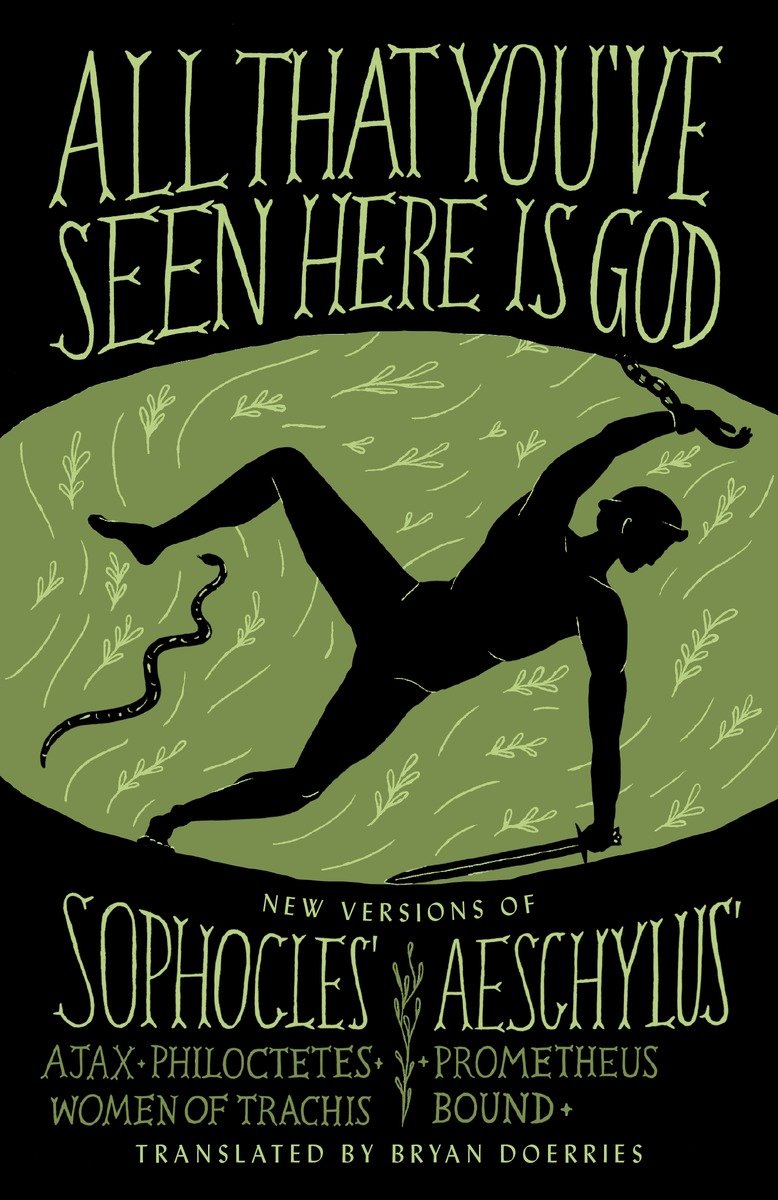All That You’ve Seen Here Is God: New Versions of Four Greek Tragedies Sophocles’ Ajax, Philoctetes, Women of Trachis; Aeschylus’ Prometheus Bound
| by |
|---|
14.00 JOD
Please allow 2 – 5 weeks for delivery of this item
Description
These contemporary translations of four Greek tragedies speak across time and connect readers and audiences with universal themes of war, trauma, suffering, and betrayal. Under the direction of Bryan Doerries, they have been performed for tens of thousands of combat veterans, as well as prison and medical personnel around the world. Striking for their immediacy and emotional impact, Doerries brings to life these ancient plays, like no other translations have before.
Additional information
| Weight | 0.4 kg |
|---|---|
| Dimensions | 2.67 × 13.31 × 20.22 cm |
| PubliCanadanadation City/Country | USA |
| by | |
| format | |
| Language | |
| Pages | 480 |
| publisher | |
| Year Published | 2015-9-1 |
| Imprint | |
| ISBN 10 | 0307949737 |
| About The Author | Bryan Doerries is a New York-based writer, director, and translator who currently serves as Artistic Director of Theater of War Productions, a company that presents dramatic readings of seminal plays and texts to frame community conversations about pressing issues of public health and social justice. A self-described evangelist for ancient stories and their relevance to our lives today, Doerries uses age-old approaches to help individuals and communities heal from trauma and loss. He is the author of a memoir, The Theater of War: What Ancient Greek Tragedies Can Teach Us Today; All That You’ve Seen Here Is God, four plays by Aeschylus and Sophocles; and The Odyssey of Sergeant Jack Brennan, a graphic novelization of Homer’s Odyssey, told from the point of view of a US Marine returning home from Afghanistan. Among his awards, he has received an honorary Doctorate of Humane Letters from Kenyon College and was named Public Artist in Residence for the City of New York. http://www.theaterofwar.com |
“This is a brilliant, original, and harrowing work.” —Andre Gregory “Knowing that these plays were originally authored by military brass, for an audience long familiar with the effects of war, you have to wonder what questions they were trying to address with their contemporaries. For the past decade, I’ve watched Bryan tirelessly pursue what these questions could have been by bringing these texts to the doorstep of the best modern source material we have, our US military. In so doing, he has created a series of translations that are accessible to both actor and audience, deeply insightful and wholly unique.” —Adam Driver “Bryan Doerries’ translations of Greek tragedy in All That You’ve Seen Here Is God seriously engage both with four Greek originals by Aeschylus and Sophocles and with his own experience in performing the plays for disparate audiences who have undergone tragic suffering in person. His spare, contemporary yet poetic lines jump from the page to serve an intense delivery that invites his audience to post-play dialogue.” —Helene P. Foley, Professor of Classics, Barnard College, Columbia University“We live in an age defined by mythic catastrophe. We live in an age of perpetual war. We therefore live in an age that requires drama of the stature contained between these covers. Bryan Doerries’ brave, spare, inspired translations of Sophocles and Aeschylus have the power to bring us into healing confrontation with ancient, brutal, and essential truth. These are plays for our time.” —Doug Hughes, Tony-award winning director of Doubt“These provocative, hard-driving renderings of Greek tragedy incarnate the enormous learning, keen auditory imagination, and expansive moral vision of Bryan Doerries, a deeply humane poet-translator who has crafted some of the most potent interpretations of ancient tragedy available in the English language.” —Thomas G. McGuire, Poetry Editor, War, Literature, & the Arts, United States Air Force Academy“Bryan Doerries’ translations roar down the tracks like a raging locomotive. The language is lean, taut, raw, vibrant. The demonic passions of ancient Greek warriors and their thousand-yard stares chase us down and leave no place to hide. The sparse staccato lines jump off the page, onto the stage, into the gut. No wonder Doerries’ revolutionary Theater of War Project has produced such powerful performances at so many theaters over recent years. This is Greek tragedy as combat therapy. There is implicit in these sparse, often unforgiving pages the hope of emotional healing, signs of renewal to be snatched from the shattered souls of wounded warriors and their shell-shocked wives. A riveting read and remarkable accomplishment!” —Stephen Esposito, Assoc. Professor Classical Studies, Boston University “Bryan Doerries’ translations are as illuminating to read as they are to perform. They emphasize personal struggle over historical gamesmanship and are translated with emotion and humor that feels not only timely but prescient.” —Jesse Eisenberg “Doerries has listened to the pain of the veteran, the patient, and the prisoner and heard the words of Sophocles and Aeschylus. He gives powerful voice to both in these stark and sensitive translations.” —Amy R. Cohen, Editor-in-Chief of Didaskalia: the Journal for Ancient Performance |
|
| Table Of Content | THE AUDIENCE AS TRANSLATOR TRANSLATOR’ S NOTE SOPHOCLES’ AJAX AN INTRODUCTIONCHARACTERS AJAX SOPHOCLES’ PHILOCTETES AN INTRODUCTIONCHARACTERS PHILOCTETES AESCHYLUS’ PROMETHEUS BOUND AN INTRODUCTION CHARACTERS PROMETHEUS BOUNDSOPHOCLES’ WOMEN OF TRACHIS AN INTRODUCTION CHARACTERSWOMEN OF TRACHISACKNOWLEDGMENTS |
| Excerpt From Book | CHARACTERS(in order of appearance)Odysseus: the director of Greek intelligenceAjax: a formidable warriorAthena: the goddess of warChorus: the sailors and soldiers of AjaxTecmessa: the battle-won wife of AjaxEurysaces: their three-year-old sonMessenger: a soldier of the Greek armyTeucer: the half brother of AjaxMenelaus: the deputy commander of the Greek armyAgamemnon: the commander of the Greek army Odysseus appears at dawn—low to the ground—darting in and out of shadows. He is searching for a safe place to wait for Ajax.Athena startles him, a voice at the borders of darkness.Athena Why am I never surprised, son of Laertes, to catch you stalking an enemy at daybreak, like a blood- hound after some scent, tracking foot- prints behind the tents where Ajax and his men hold down the battle line? You wish to know if he’s inside, soaked in sweat from the slaughter? Then tell me what you’ve come to do, and you may learn from one who knows. Odysseus Dearest Athena, guardian goddess, though your shape evades my eyes, I hear you clearly in my mind, like the tune of a song to which I somehow know the words. I’m circling in on an enemy, just as you’ve guessed, close on his heels. I have come for Ajax, the one we called the "shield." It is he alone whom I now hunt. Last night, he did some- thing vile, some vile thing, some- thing un- imaginable, if he is the one, we cannot be sure, still shaken by the sight of it, and so they sent me here to confirm what he has done. All of our cattle are dead, and the men who tended them, hacked to pieces, butchered by a hand—his, we think—for one of our men swears to have seen him sprinting across the field with a wet sword. As soon as I heard, I was on the case, following the tracks, which led me here, but I’ve been thrown by strange markings in the mud and cannot find him anywhere. You have arrived, as always, at the right moment to guide me with your hand. Athena steps out of the shadows. Athena Obviously, Odysseus, I came to help with the hunt. Odysseus Then I am on the right track? Athena He is the one you describe: the killer of cows. Odysseus A reckless gesture, but why did he do it? Athena Black bile—blinding rage—over the arms of Achilles. Odysseus But what drove him to attack the animals? Athena In his mind, their blood was yours. Odysseus He wished to kill the Greeks? Athena Affirmative. He would have completed his mission had I not been paying attention. Odysseus Where did he find the courage to do it? Athena He stalked you quietly in the night. Odysseus How close did he come to his target? Athena Close enough to strike the generals. Odysseus And what contained his bloodlust? Athena I did. I robbed him of the pleasure of cutting you to pieces, raining on his death parade, distracting him with visions of bovine foes grazing in the fields under the watchful eyes of simple herdsmen. He descended upon them with full fury, ripping out horns with his hands, slitting throats and snapping spines, at one point squeezing the life from a general, then taking the lives of other officers, or so he thought, trembling from contamination. I stoked his rage, driving him deeper into the snare. Finally tired from all the killing, he bound and gagged his sad prisoners, those pitiful few cows and sheep some- how still standing, and rounded them up for the death march back to his camp, convinced they were men. He tortures them inside the tent. And now I will expose you to his illness, so you may see it with your own eyes. Stand there, like a man. He won’t hurt you, as long as I am here. Don’t worry. I will hide you in his blind spot; he won’t see you in the shadows. Athena turns and shouts toward the tent. You, there, in the tent, stretching prisoners on the rack, put down your ropes; report to me immediately! Odysseus What are you doing? Lower your voice. Athena Watch what you say. Someone might call you a coward. Odysseus Please, Athena, by the gods, let him stay inside the tent. Athena He’s only a man, not to be feared, the same as before. Odysseus He was and is my enemy. Athena Well isn’t it satisfying to laugh at an enemy? Odysseus It would please me more if he stayed within. Athena Are you afraid to gaze upon a maniac? Odysseus When he was sane, I would have met his stare. Athena He won’t see you standing before him. Odysseus Isn’t he looking through the same eyes? Athena I’ll shade his eyes and darken his vision. Odysseus Whatever the goddess wants, she takes. Athena Stand there silently. Do not move! Odysseus I must remain, against my wishes. |
Only logged in customers who have purchased this product may leave a review.
Related products
-
On backorder 2-5 Weeks to Arrive
140.00 JOD -
On backorder 2-5 Weeks to Arrive
36.99 JOD -
On backorder 2-5 Weeks to Arrive
20.00 JOD -
On backorder 2-5 Weeks to Arrive
90.00 JOD






Reviews
There are no reviews yet.